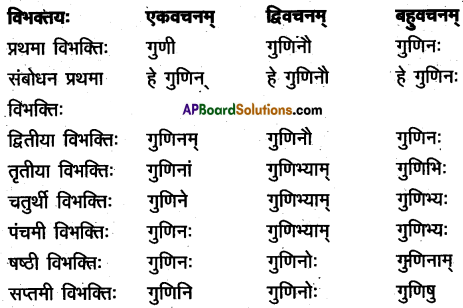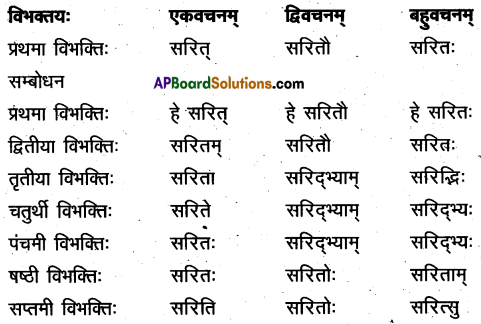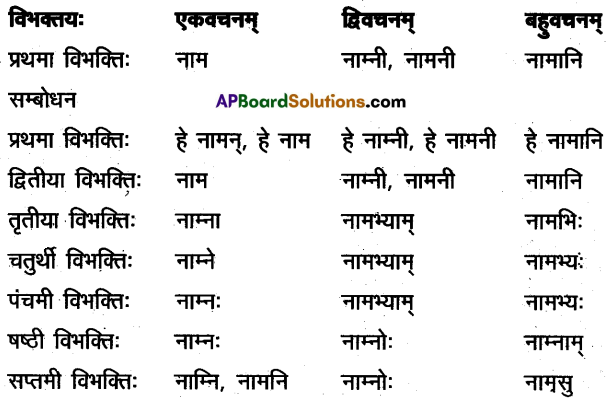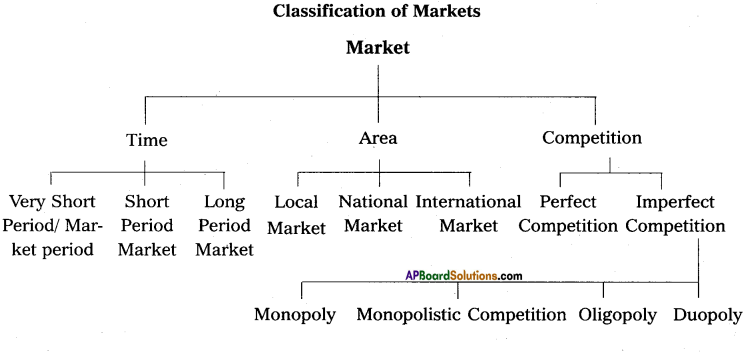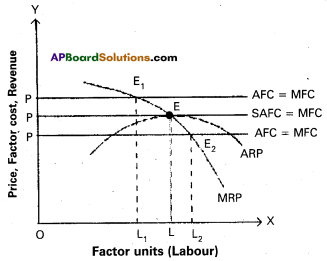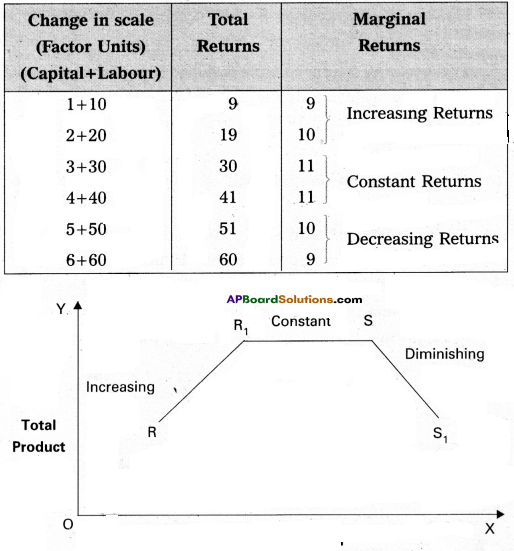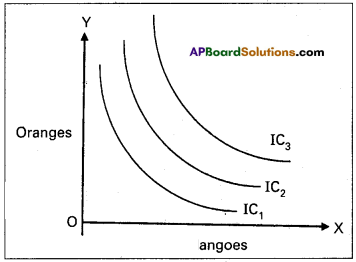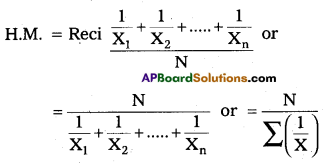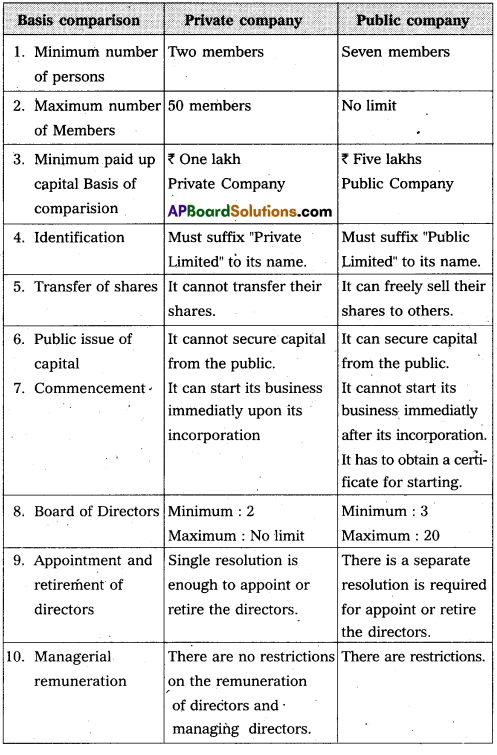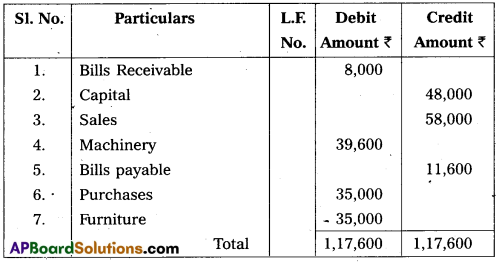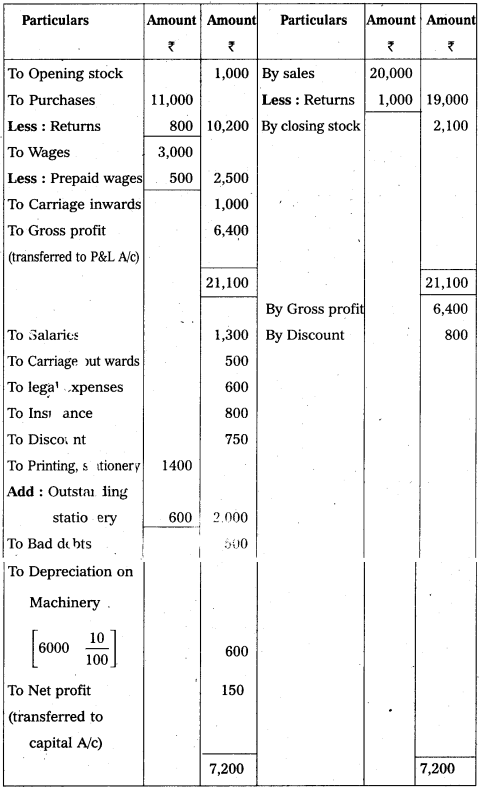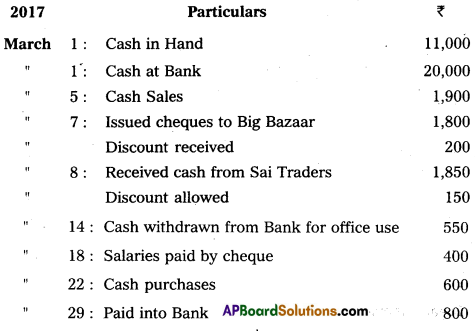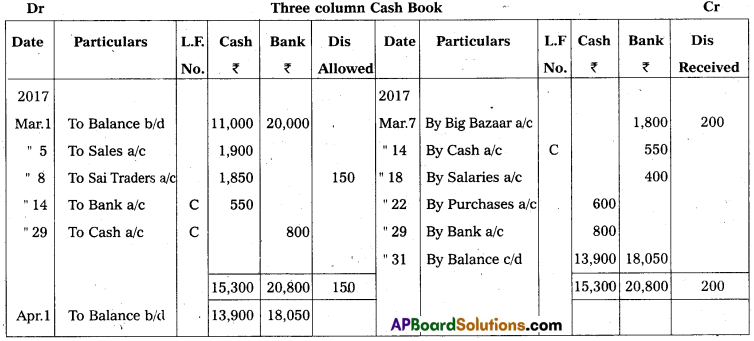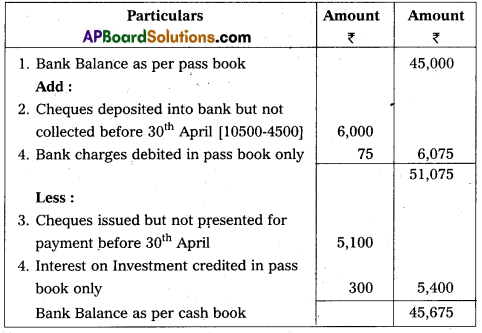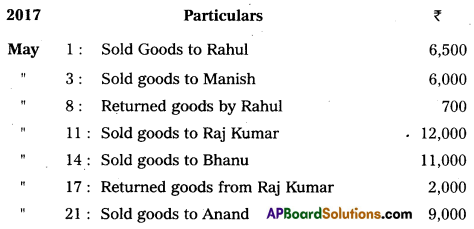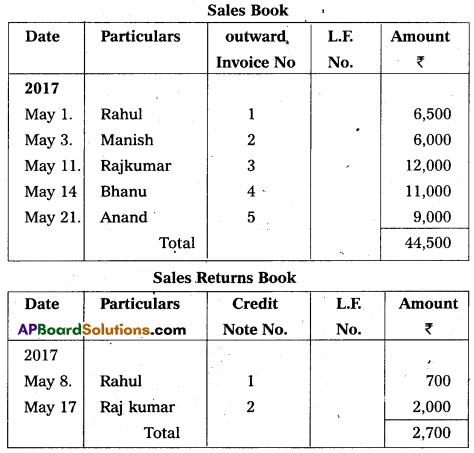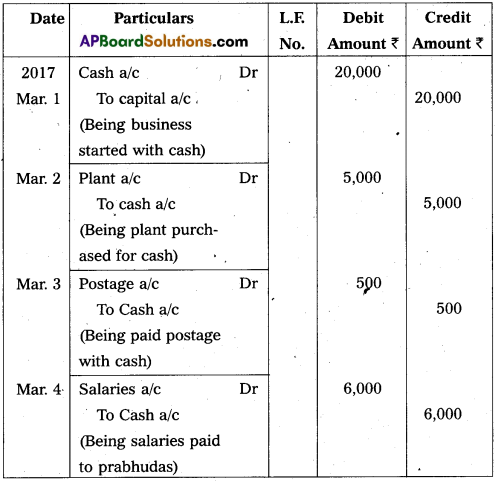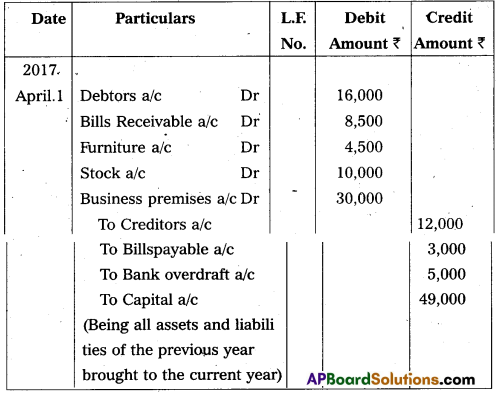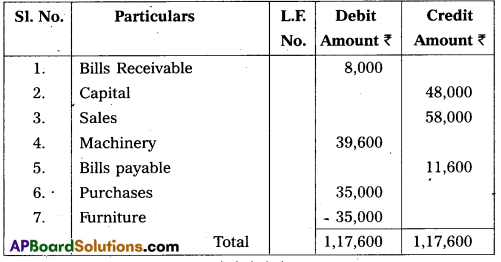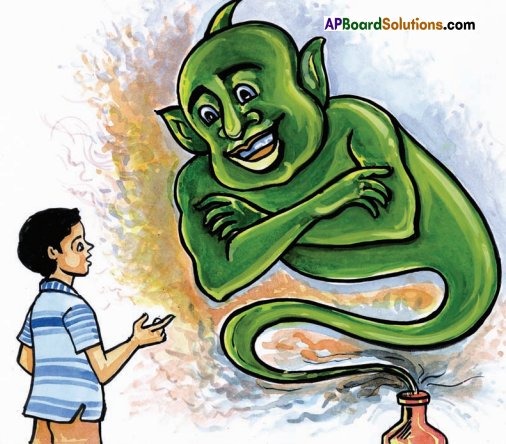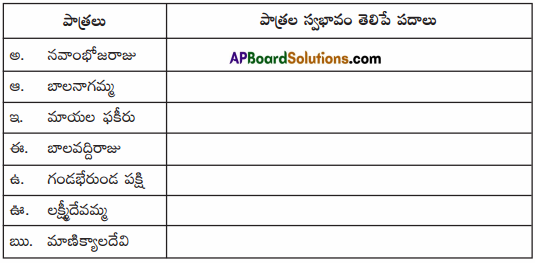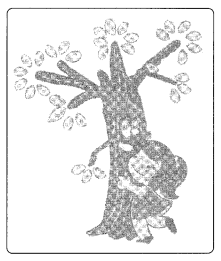These TS 8th Class English Important Questions 7th lesson Women Empowerment will help the students to improve their time and approach.
TS 8th Class English Important Questions 7th lesson Women Empowerment
Section – A : Reading Comprehension (25 Marks)
Questions : (1 – 10), Marks : 15
1. Read the following text.
The moment I see letters waiting for me on the doorstep when I return from work, I can’t contain my excitement. It’s almost as if I’m face to face with my near and dear one sand they are speaking affectionately to me. Instantly the exhaustion of office work vanishes and my heart grows light.
Instead of entering the kitchen muttering, ‘Oh no, Oh God’— which is what I usually do when I come back tired – I feel like singing a song, humming a tune, making a nice cup of coffee and savouring each sip. What is more, the sight of inland letters or envelopes in a familiar hand gives me the energy and enthusiasm to quickly make and eat some pakodas or bajjis! Even though I am lazy about writing letters I love to receive one from some place or the other, every day.
This is an unexpected letter. If my Akkayya, who doesn’t normally write, went out of her way to write a letter, there has to be a reason. As I open the letter, I am a little apprehensive. I hope it is not some bad news. Actually, when things are fine, no one bothers to write …

Now, answer the following questions. Each question has four choices.
Choose the correct answer and write (A), (B), (C) or (D) in your answer booklet. (5 × 1 = 5M)
Question 1.
After coming from office work she enters the kitchen usually _________
A) willingly
B) unwillingly
C) happily
D) sadly
Answer:
B) unwillingly
Question 2.
Akkayya writes letters to her _________
A) frequently
B) daily
C) often
D) very rarely
Answer:
D) very rarely
Question 3.
The writer likes _______
A) to receive the letters
B) to write the letters
C) to read the letters
D) to send the letters
Answer:
A) to receive the letters
Question 4.
When she opens the letter from her Akkayya
A) she is very much worried
B) she feels joyful
C) she is very angry
D) she doesn’t feel anything
Answer:
A) she is very much worried
Question 5.
The easiest and fastest method to send information is _________
A) sending a message through mobile or
B) sending a letter by post
C) sending information through g-mail
D) sending a person to give information
Answer:
C) sending information through g-mail

Answer the following questions in two or three sentences each. (5 × 2= 10M)
Question 6.
How does the writer’s tiredness of office work vanish ?
Answer:
If the writer finds a letter when she returns from her work, she doesn’t contain her excitement. Instantly the exhaustion of office work disappears and her heart grows light.
Question 7.
What gives her energy and enthusiasm to make eatables quickly in the kitchen ?
Answer:
The sight of inland letters or envelopes in a familiar hand gives the writer the energy and enthusiasm to quickly make eatables in the kitchen.
Question 8.
Why does she feel very much excited when she sees the letters on the door step ?
Answer:
When she receives letters from someone, she feels that she is face to face with her near and dear ones. She also feels that they are speaking affectionately to her. So she feels very much excited when she sees the letters on the door step.
Question 9.
In what way is the letter more effective than mobiles to share our feelings with the near and dear ?
Answer:
When we write letters we express our feelings and thoughts in the correct manner so that the receiver understands us well. There is a plenty of time for us to convey our feelings. It is almost as if we are face to face with our near and dear ones and they are speaking affectionately to us. The feelings and thoughts, which can’t be expressed through mobiles, can be expressed through letters.
Question 10.
Do you feel like eating anything after going back home ? Why ?
Answer:
Yes, I feel like eating something after going back home. After studies and playing games, I feel’ very hungry. So I want something to eat when I go back from school.

2. Read the following text.
Akkayya and Baavagaru were coming to this city and our home for the first time since my marriage. I had looked forward to their visit all these years. They had never left their little village to go anywhere. Using children, cattle, cooking etc., as excuses, they had always avoided moving out. Under such circumstances, imagine their coming to our house and tb this big city!
Akkayya is not as educated as me. By “not as educated” I mean Nannagaru did not let her study after Class Five. Of what use was education for a girl ? Those were the days when people thought it was enough if a girl was able to keep the washerman’s accounts. A decade later, when I was born, there wasn’t much debate as to whether a girl should have education or not.
I was lucky that my father changed with the times. He didn’t even hesitate to send me to college. No girl who is well educated can be satisfied with staying at home, being a housewife and looking after the household after marriage. She would want to put her education to good use and achieve something in life. I too was driven by the same desire. Even though my husband had a good job, I took up one as well.
Now, answer the following questions. Each question has four choices.
Choose the correct answer and write (A), (B), (C) or (D) in your answer booklet. (5 × 1 = 5M)
Question 1.
Akkayya and Bavagaru had never left their village to go anywhere because _______
A) they don’t like to go anywhere
B) they like to go but didn’t get the chance
C) they are very busy with their jobs
D) they are busy with children, cattle, cooking, etc.
Answer:
Question 2.
A girl should receive education _________
A) to keep the washerman’s account
B) to keep the household’s account
C) to empower herself
D) to work in office
Answer:
C) to empower herself
Question 3.
A decade is _________
A) ten years
B) hundred years
C) twenty five years
D) fifty years
Answer:
A) ten years
Question 4.
An educated girl will be satisfied
A) staying at home
B) being a housewife and looking after household
C) making good use of education in life
D) when elders praise her
Answer:
C) making good use of education in life
Question 5.
The narrator took up a job as _________
A) her husband forced her to do
B) she was badly in need of money
C) for pleasure
D) she wanted to achieve something in life
Answer:
D) she wanted to achieve something in life

Answer the following questions in two or three sentences each. (5 × 2 = 10M)
Question 6.
How did the narrator feel at her Akkayya’s visit ? ’
Answer:
She was very excited about her Akkayya’s visit. She had looked forward to Akkayya’s visit.
Question 7.
Why was Akkayya not educated ?
Answer:
Nannagaru did not let Akkayya study after Class Five. He thought that there was not any use of education for a girl. Those were the days when people thought it was enough if a girl was able to keep the washerman’s accounts. So Akkayya was not educated.
Question 8.
What was father’s opinion on girl child education ?
Answer:
Father was of the opinion that there was not any use of education for a girl. In those days people thought it was enough if a girl was able to keep the washerman’s accounts.
Question 9.
I was lucky that my hither changed with the time.” Why was narrator lucky ? Do you think she is lucky ?
Answer:
Though Father was of the opinion that there was not any use of education for a girl, he changed with the times. When she was born, there was not much debate as to whether a girl should have education or not. He didn’t even hesitate to send her to college. Thus the narrator was lucky. I too think she is lucky.
Question 10.
Do you think a girl child needs education ? Justify your answer.
Answer:
Yes, I think a girt child needs education to empower herself. Depending on another persons doesn’t promise peace and security for oneself. To make her independent, a girl child needs education.

3. Read the following text.
Akkayya is not as educated as me. By “not as educated” I mean Nannagaru did not let her study after Class Five. Of what use was education for a girl? Those were the days when people thought it was enough if a girl was able to keep the washerman’s accounts. A decade later, when I was born, there wasn’t much debate as to whether a girl should have education or not.
I was lucky that my father changed with the times. He didn’t even hesitate to send me to college. No girl who is well educated can be satisfied with staying at hoirie, being a housewife and looking after the household after marriage. She would want to put her education to good use and achieve something in life. I too was driven by the same desire.Even though my husband had a good job, I took up one as well.
Because Akkayya was not educated, she was married to a man from the village. Though my Baavagaru was educated, his ideals made him choose agriculture as his profession and he settled down in the village to cultivate his land. Akkayya grew accustomed to the village life.
Now, answer the following questions. Each question has four choices.
Choose the correct answer and write (A), (B), (C) or (D) in your answer booklet. (5 × 1 = 5M)
Question 1.
A decade later, when I was born _______ the word “decade” means _______
A) 5 years
B) 10 years
C) 25 years
D) 50 years
Answer:
B) 10 years
Question 2.
The narrator was married to _________
A) a villager
B) a farmer
C) an uneducated man
D) an educated man
Answer:
D) an educated man
Question 3.
He didn’t even hesitate to send me to college. Here ‘He’ refers to _______
A) Baavagaru
B) Narrator
C) Narrator’s father
D) Narrator’s husband
Answer:
C) Narrator’s father
Question 4.
Baavagaru chose agriculture as his profession because _________
A) his father didn’t want him to do job
B) his ideals made him choose
C) he didn’t like to leave the village
D) his wife wanted to live n a village
Answer:
B) his ideals made him choose
Question 5.
No girl who is well educated can be satisfied with staying at home because she
A) wants to achieve something in life
B) wants to fulfill all her desires
C) helps her family with her earnings
D) enjoys a comfortable life
Answer:
A) wants to achieve something in life

Answer the following questions in two or three sentences each. (5 × 2 = 10M)
Question 6.
In what way is the narrator more fortunate than her sister ?
Answer:
The narrator’s father did not let Akkayya study after Class Five as he thought that there was no use of education for a girl. Later he changed his opinion and allowed the narrator to study. Thus the narrator is more fortunate than her sister.
Question 7.
Why didn’t Nannagaru let Akkayya study after Class Five ?
Answer:
Nannagaru was of the opinion that there was not any use of education for a girl child. Hence he didn’t let Akkayya study after Class Five.
Question 8.
Can one be independent without a job or earning ? Why ? Why not ? Give reasons.
Answer:
One can’t be independent without a job or earning. The woman without earning has to beg anyone for anything. She has to depend on her husband for everything. She hits to live under her husband’s thumb, like a scorpion under a slipper.
Question 9.
Why did Akkayya get married to a villager ?
Answer:
As Akkayya was not educated, she got married to a villager.
Question 10.
Is education useful for a girl ? Why/why hot ? Justify your answer.
Answer:
Yes, education is useful for a girl. It empowers her. Depending on another persons doesn’t promise peace and security for oneself. To make her independent, a girl child needs education.

4. Read the following text.
From the very start Akkayya had been keen on studying. But Nannagaru didn’t educate her. Because she was not adept at oral arithmetic, Nannagaru had said, “Ah ‘she’s a girl, how will studies get into her head?” and had made her discontinue her lessons concentrating only on Annayya’s education. Because she was uneducated, she got married to a man from a village, had to look after the cattle, keep the Stove clean, draw water from the well… Amma used to be very upset that Akkayya had to go through such drudgery. Realizing that Akkayya was upset thinking of the past, and in an attempt to divert her mind, I led her to the balcony saying, “Come, let’s go and sit outside.”
Looking at the plants in the flowerpots, Akkayya mentioned that till the cucumbers, drumsticks and gongura were from their own backyard. I asked her to send some gongura seeds the next time someone came this way…
“But, Ammalu, what’s this? Why have you planted the turayi and pomegranate trees in these flowerpots? See, how stunted they have become! If, like flower plants, you put these frees in pots instead of letting them grow freely in the backyard, how will they grow?” she asked, surprised, feeling sorry for the trees.
I burst into laughter. Akkayya was perplexed.
Now, answer the following questions. Each question has four choices.
Choose the correct answer and write (A), (B), (C) or (D) in your answer booklet. (5 × 1 = 5M)
Question 1.
The expression, “She was not adept at oral arithmetic,” means _________
A) She was able to do oral arithmetic skilfully
B) She was unable to do oral arithmetic skilfully
C) She was not interested in oral arithmetic
D) She was only interested in oral arithmetic
Answer:
B) She was unable to do oral arithmetic skilfully
Question 2.
Ammalu took Akkayya to balcony because _______
A) to divert her mind
B) to show her the garden
C) to show her a big tree
D) to show her sandstorm
Answer:
A) to divert her mind
Question 3.
What does the narrator mean by saying, “From the very start Akkayya had been keen on studying” ?
A) Akkayya didn’t like studies.
B) Akkayya kept away from studies from the beginning.
C) Akkayya was not interested in studies.
D) Akkayya was interested in studies from the beginning.
Answer:
D) Akkayya was interested in studies from the beginning.
Question 4.
Akkayya married a villager because _________
A) she loved him
B) she didn’t want to marry a town resident
C) she was uneducated
D) she was educated
Answer:
C) she was uneducated
Question 5.
“I burst into laughter” – She burst into laughter because ________
A) at Akkayya’s innocence
B) to make fun of Akkayya
C) She always laughed like that
D) Akkayya made a funny thing
Answer:
A) at Akkayya’s innocence

Answer the following questions in two or three sentences each. (5 × 2 = 10M)
Question 6.
“But Nannagaru didn’t educate her.” Why do you think Nannagaru didn’t educate her ?
Answer:
Nannagaru didn’t educate her because she was not adept at oral arithmetic. He was of the feeling that studies wouldn’t get into a girl child’s head.
Question 7.
Amma used to be very upset. Why ?
Answer:
As Akkayya was uneducated, she got married to a villager. So she had to look after the cattle, keep the stove clean, draw water from the well, etc. Amma was upset that Akkayya had to go through such drudgery.
Question 8.
What did Akkayya mean by saying, “Why have you planted the turayi and pomegranate trees in these flower pots ?” ?
Answer:
Akkayya was surprised to see the turayi and pomegranate trees in the flowerpots. She didn’t like them to confine those trees to the small pots. She felt that they should be allowed to grow freely in the backyard, otherwise, they wouldn’t grow.
Question 9.
Why was Akkayya perplexed ?
Answer:
When Akkayya expressed her sorry for the turayi and pomegranate trees which were made to grow in the flowerpots, the narrator burst into laughter. So Akkayya was perplexed.
Question 10.
Do you think Nannagaru did a right thing in not educating Akkayya ? Justify your answer.
Answer:
Nannagaru didn’t do a right thing in not educating Akkayya. As Akkayya was unedu¬cated, she had to marry a villager. She had to go through drudgery. She had to depend upon her husband for everything.

5. Read the following text.
“I did it on purpose. It’s a special method. It’s called bonsai in Japan. You can grow even a huge banyan tree in a flowerpot. You can grow it even with its roots hanging down from the branches. You have no idea how beautiful a pomegranate tree looks when you keep cutting its branches,; changing the pot now and then, trimming it into a small-sized tree and making it bear fruit! Do you know how care¬fully you have to tend this small tree? Bonsai is a great art” I said.
But it seemed as if Akkayya didn’t appreciate what I said. “I don’t know. You have confined aturayi tree to a flowerpot when it could have grownto the height of a building,” she sighed.
Feeling disheartened at being unable to impress Akkayya with my bonsai, I collapsed weakly into a chair. I was most distressed – as if the entire art I had learnt had come to nought. It was like throwing perfume into ash. Suddenly a dust storm began to rage. The sand hit our faces harshly. I caught hold of Akkayya’s shoulder and dragged her into the room. Then I closed the doors and windows in a hurry. Akkayya was stunned.
“What’s all this? Everything was normal till now. Where did that dust and wind come from suddenly? You have tar roads too,” she said.
“This is how it is in the big city, my dear. Before we know what is happening, the storm brings all the sand from the Rajasthan desert and hits our face. . .” I had not completed my sentence when I could hear the rain beginning to fall. I opened the door and pulled the bonsai tree pots and flowerpots inside, under the canopy. Akkayya opened side window and looked at the streets to observe the weather in the Indian capital. “Look, Ammalu, look there,” she said? A new enthusiasm seemed to have crept into her voice. I looked eagerly through the window towards the street, I couldn’t understand what she meant. I looked at her and said, “What is it?’

Now, answer the following questions. Each question has four choices.
Choose the correct answer and write (A), (B), (C) or (D) in your answer booklet. (5 × 1 = 5M)
Question 1.
What does ‘it’ refer to in the expression, “It’s a special method.” ?
A) growing plants naturally
B) keeping turayi plants in pots
C) growing plants in bonsai technique
D) keeping pomegranate trees in pots
Answer:
C) growing plants in bonsai technique
Question 2.
The mood of the expression, “You have confined a turayi tree to a flowerpot when it could have grown to the height of a building,” is ________
A) anxiety
B) worry and sorrow
C) joy
D) melancholy
Answer:
B) worry and sorrow
Question 3.
Ammalu was most distressed because ________
A) she was unable to impress Akkayya with her art
B) she was impressed by Akkayya
C) Ammalu didn’t like the firt of bonsai
D) Akkayya threw perfume into ash
Answer:
A) she was unable to impress Akkayya with her art
Question 4.
Ammalu pulled the bonsai tree pots inside because ________
A) she used to pull them daily
B) to show them to Akkayya
C) to free the plants
D) to protect them from rain
Answer:
D) to protect them from rain
Question 5.
The bonsai plant is compared to _______
A) the life of a working woman
B) the life of a housewife
C) the life of an educated woman
D) Ammalu’s life
Answer:
B) the life of a housewife

Answer the following questions in two or three sentences each. (5 × 2 = 10M)
Question 6.
“Feeling disheartened at being . .” Who was disheartened ? Why ?
Answer:
Ammalu was disheartened. She was unable to impress Akkayya with her bonsai so she was disheartened.
Question 7.
What similarities do you notice between the bonsai tree and the housewife ?
Answer:
A bonsai tree is not allowed to grow to its full potential. A housewife is also not- permitted to develop herself to her natural capacity. A bonsai tree is limited to the pot. A housewife is Confined to her home. A bonsai tree is dependent. A housewife too has no independence. Thus the writer says housewives lead bonsai life.
Question 8.
How is a bonsai reared ? Do you like it ? Why (not) ?
Answer:
Bonsai is a great art from Japan. A tree is planted in a flowerpot. Its branches are, as they grow, cut regularly. The pot is changed now and then. Trimming is continued in a very careful and systematic way. Bonsai trees are thus grown. I like a bonsai tree because it looks very smart.
Question 9.
Why do you think Akkayya was stunned ?
Answer:
When Ammalu sat in a chair with great disappointment a dust storm suddenly began to rage. The sand hit both the sisters’ faces harshly. Ammalu caught hold of Akkayya’s shoulder and dragged her into the room. Then Ammalu closed the doors and windows in a hurry. Seeing all this, Akkayya was stunned.
Question 10.
What is the theme of the above text ?
Answer:
The need to empower women is the theme of the story ‘Bonsai Life’. It explains how an uneducated woman’s life is limited and dependent like that of a bonsai tree.

Questions: (11 – 16), Marks : 10
1. Read the following passage.
The adventures of Mark Twain’s life are as interesting as any of the stories in his writings. His real name was Samuel Clemens; “Mark Twin” was just his pen-name. His friends called him Sam.
At the beginning of our story, Sam was on board the ship, Quaker City. He was travelling with a group of tourists who were going to visit the Holy Lands in the Middle East. Though he was young, he had already published many humorous stories and funny articles, which won him a name. Now he had been sent on the ship by a newspaper which wanted him to write an account of the trip. This he did, making the readers at home roar with laughter with his humorous description of holy places. Learning the high price of boat hire on the sea of Galilee, he remarked, “No wonder Jesus walked !” (There is a story in the Bible that Jesus once walked on the sea of Galilee.)
On the ship, Sam made friends with a shy, eighteen-year-old boy, Charles Langdon. One day Charles took Sam to his room and showed him pictures of his family. There was one picture which showed a young girl with neatly parted hair and an angelic face. This, Charles explained, was his sister, Olivia. Sam fell in love with the girl in the picture.
When the trip was over, the friends parted. Back in New York, Sam found that his articles about the trip had been greatly appreciated and that he had become, as a result, even better known to readers. A lady, Mrs. Fairbanks, who cared for Sam almost like a mother, told him that now he should get married. “A good wife,” she said, “would be a great help to progress.” But Sam only made a joke. He said, “A good wife would be a great help to progress, of course progress from house to house, because I couldn’t pay the rent.”
Now, answer the following questions. Each question has four choices.
Choose the correct answer and write (A), (B), (C) or (D) in your answer booklet. (2 × 1 = 2M)
Question 11.
Mark Twain was well-known for ________
A) his poetry
B) his moral stories
C) his editing
D) his sense of humour
Answer:
D) his sense of humour
Question 12.
Mark Twain made the readers laugh ________
A) with his humorous description of holy places
B) with his jokes
C) by accompanying them
D) with his pictures
Answer:
A) with his humorous description of holy places
Answer the following questions in two or three sentences. (4 × 2 = 8M)
Question 13.
Why was Sam sent on the ship ?
Answer:
Sam was a humorous story writer. He was famous for his funny articles. He was sent on the ship by a newspaper which wanted him to write an account of the trip.
Question 14.
What does Sam mean by saying, “No wonder Jesus walked ! ” ?
Answer:
When he learned the high price of boat hire QU the sea of Galilee, he remarked, “No wonder Jesus walked !” He played a joke here. There is a story in the Bible that Jesus once walked on the sea of Galilee. To express that the boat hire was very high, he remarked so.
Question 15.
When the trip was over, Sam became even better known to readers. How ?
Answer:
During the trip, Sam made the readers at home roar with laughter with his humorous description of holy places. When Sam was back in New York, he found that his articles about the trip had been greatly appreciated. As a result, he had become even better known to readers.
Question 16.
Who was Olivia ? What kind of a person was she ?
Answer:
Olivia was Charles Langdon’s sister. She was a young girl with neatly parted hair and an angelic face. Sam fell in love with her when he saw her picture.

2. Read the following passage.
There is a story about a kind tree and a little boy. The little boy played in the shade of the tree every day. The tree loved him very much. One day the boy sat at the foot of the tree. There were tears in his eyes.
“Why are you crying ?” asked the tree. “Because I’m hungry,” said the little boy.
“Eat my fruit,” said the kind tree, and bent down one of its branches. The boy ate the fruits and was happy. The boy grew up. One day he sat under the tree. He was sad. “Why are you sad ?” asked the tree. “I’m going to marry,” said the young man. “But I have no house to live in.” “Cut down my branches,” said the tree. “And build a house.” The young man built a house with the branches of the tree. The young man became a sailor. One day he sat under the tree. He looked unhappy. “Why are you unhappy ?” asked the tree.
“Because my captain is a bad man and cruel to me,” said the sailor. “I want to have my own ship.” “Cut down my trunk and build a ship,” said the tree. The sailor built a ship on his own. The tree was gone. Only the stump was there. In ten years, the sailor lost his ship. He came home. He was a helpless old man ! One cold winter day the old man stood near the stump of the old tree. He leaned on his stick and trembled with cold. “Make a fire out of me,” said the stump of the tree, “and warm yourself.” The stump of the kind tree burned in the fire.

Now, answer the following questions. Each question has four choices.
Choose the correct answer and write (A), (B), (C) or (D) in your answer booklet. (2 × 1 = 2M)
Question 11.
There were tears in the boy’s eyes because _________
A) someone injured him
B) his father beat him
C) he was hungry
D) he had to leave his village
Answer:
C) he was hungry
Question 12.
The tree offered its stump to _________
A) the boy
B) the sailor
C) the young man
D) the old man
Answer:
D) the old man
Answer the following questions in two or three sentences. (4 × 2 = 8M)
Question 13.
Why was the boy crying ?
Answer:
The boy was hungry. So he was crying.
Question 14.
How did the kind tree in the story help the little boy ?
Answer:
The kind tree told tree boy to eat its fruit. It bent down one of its branches and offered him its fruit. The boy ate the fruit and was happy.
Question 15.
Why do you think the sailor was unhappy ?
Answer:
The sailor’s captain was a bad man and cruel to him. He wanted to have his own ship. But he couldn’t get it. So he was unhappy.
Question 16.
What is the main theme of the above text ?
Answer:
Trees help us in many ways. They are very kind and friendly. They are selfless. They help us but don’t want anything in return.

3. Read the following passage.
Eshwar Chandra Vidyasagar was a great social reformer. He fought hard against many evil practices and blind believs which affected the Indian society of his time. He strongly felt that people of India should develop love for their country. He taught them self-respect. It was his habit surprising people with his good acts.
Vidyasagar was born in a poor family in Bengal in 1820. It was very difficult for him to educate himself. He overcame the problems to become a great Sanskrit scholar.
Once Vidyasagar saw a poor boy selling fruit. Vidyasagar asked him what he would do if he gave him Rs. 10/-. The boy replied that he would buy more fruit and sell them and earn more money. Vidyasagar was pleased with this answer and gave him a ten rupee note.
A few years later Vidyasagar found a large fruit-stall in a busy street. He was surprised to find that it was named after him. He asked the owner of the stall why he had named it ’Vidyasagar Fruit-stall’. The owner replied that it was with Vidyasagar’s help that he had opened such a big stall. Vidyasagar felt very happy.
This great man always dressed himself in the simple. Indian style. He had great sympathy for the poor. He earned a lot of money but he gave away most of it to the needy and the suffering people.
Now, answer the following questions. Each question has four choices.
Choose the correct answer and write (A), (B), (C) or (D) in your answer booklet. (2 × 1 = 2M)
Question 11.
Vidyasagar’s habit was ________
A) to educate others
B) to study Sanskrit
C) to surprise people with his good acts
D) to teach others
Answer:
C) to surprise people with his good acts
Question 12.
Vidyasagar Fruit-stall was named after Vidyasagar because ________
A) the owner of the stall was helped by Vidyasagar
B) the owner’s name was Vidyasagar
C) he loved the name of Vidyasagar
D) the name of owner’s son was Vidyasagar
Answer:
A) the owner of the stall was helped by Vidyasagar
Answer the following questions in two or three sentences. (4 × 2 = 8M)
Question 13.
How did Vidyasagar always dress himself ?
Answer:
Vidyasagar always dressed himself in the simple Indian style. He didn’t follow western culture.
Question 14.
What qualities did Vidyasagar want people to possess ?
Answer:
Vidyasagar strongly felt that Indians should develop love for their country. He wanted them to possess self-respect.
Question 15.
Why was it difficult for him to get educated in his childhood ?
Answer:
Vidyasagar was born in a poor family. His poverty made it difficult for him to get educated in his childhood.
Question 16.
When did Vidyasagar feel very happy ?
Answer:
Once Vidyasagar gave a poor boy a ten rupee note. Later that boy opened a fruit- stall and named it Vidyasagar Fruit-stall.’ A few years later, Vidyasagar was surprised when he saw his name. He asked the owner of the stall why he had named it so. The owner replied that it was with Vidyasagar’s help he had opened such a big stall. Then Vidyasagar felt very happy.

4. Read the following passage.
Wilma Rudolph was born in a poor family in Tennessee. At the age of four, she had pneumonia with scarlet fever which left her paralyzed with polio. She had to wear a brace and the doctor said she would never put her foot on earth. But her mother encouraged her. She told Wilma that with God-given ability, persistence and faith she could do anything she wanted. Wilma said, “I want to be the fastest woman runner in the world.”
At the age of nine, against the advice of the doctor, she removed the brace and took the first step. At the age of 13, she entered her first race and came way, way last. And then she entered her second, and third, and fourth traces, and came way, way last until a day came when she came in first.
At the age of 15 she went to Tennessee State University where she met a coach by the name of Ed Temple. She told him, “I want to be the fastest runner in the world.” Temple said, “With your spirit nobody can stop you and besides I’ll help you.”
The day came when she was at the Olympics – and at the Olympics, you are matched with the Best of the best. Wilma was matched against a woman named Jutta Heine who had never been beaten. The first event was the 100-metre race. Wilma beat Jutta Heine and won her first gold medal. The second event was the 200-metre race and Wilma beat Jutta a second time and won her second gold medal. The third event was the 400-metre relay and she was racing against Jutta one more time.
In the relay, the fastest person always runs the last lap and they both anchored their teams. The first three people ran and changed the baton easily. When it came to Wilma’s turn, she dropped the baton. But Wilma saw Jutta shoot up at the other end ; she picked up the baton, ran like a machine, beat Jutta a third time, and won her third gold medal. It became a history : that a paralytic woman became the fastest woman on this earth at the 1960 Olympics.
Now, answer the following questions. Each question has four choices.
Choose the correct answer and write (A), (B), (C) or (D) in your answer booklet. (2 × 1 = 2M)
Question 11.
“At the age of nine, against the advice of the doctor ” What was the advice of the doctor ?
A) Wilma would be paralyzed if she tried to run.
B) Wilma would be in bed till the end.
C) Wilma wouldn’t run.
D) Wilma had to wear a brace and would never put her foot on earth.
Answer:
D) Wilma had to wear a brace and would never put her foot on earth.
Question 12.
The speciality of 1960 Olympics is ________
A) a paralytic woman became the fastest woman
B) Wilma matched against Jutta
C) Wilma beat Jutta
D) Wilma won two gold medals
Answer:
A) a paralytic woman became the fastest woman
Answer the following questions in two or three sentences. (4 × 2 = 8M)
Question 13.
What was Wilma’s dream ?
Answer:
Wilma’s dream was to become the fastest woman runner in the world.
Question 14.
How was Jutta Heine matched with Wilma ?
Answer:
In her first attempt, Wilma beat Jutta Heine and won her first gold medal. In 200- metre race she beat Jutta a second time and won her second gold medal. In 400- metre relay, she won her third gold medal against Jutta.
Question 15.
What qualities of Wilma helped her win the Olympic medals ?
Answer:
God-given ability, Wilma’s persistence and faith helped her win the Olympic medals.
Question 16.
Who was Wilma’s coach ? How did he encourage her ?
Answer:
Wilma’s coach was Ed Temple. He encouraged her by telling her that nobody could stop her with her spirit and besides he would help her to achieve her goal.

5. Read the following poem.
In the heart of a seed,
Buried deep, so deep
A dear little plant
Lay fast asleep.
“Wake,” said the sunshine,
“And creep to the light.”
“Wake,” said the voice
Of the raindrops bright.
The little plant heard,
And it rose to see
What the wonderful ,
Outside world might be.
Now, answer the following questions. Each question has four choices.
Choose the correct answer and write. (A), (B), (C) or (D) in your answer booklet. (2 × 1 = 2M)
Question 11.
The plant lay asleep _________
A) in water
B) in the heart of a seed
C) in the sunshine
D) in rain
Answer:
B) in the heart of a seed
Question 12.
What figurative expression do you find in, “The little plant heard,” ?
A) Personification
B) Simile
C) Metaphor
D) Hyperbole
Answer:
A) Personification
Answer the following questions in two or three sentences. (4 × 2 = 8M)
Question 13.
How is the plant described ?
Answer:
The little plant is in the heart of seed. It is asleep deep in the earth.
Question 14.
“The little plant heard.” – Who spoke the words heard by the plant ?
Answer:
The sunshine and the rain drops spoke the words.
Question 15.
Why do you think the world was wonderful to the little plant ?
Answer:
The little plant didn’t see the world outside till then. It was in the heart of a seed. So, when it came out the world seemed to be wonderful.
Question 16.
Why did the poet choose the sunshine and the raindrops and not a bird or anything else ?
Answer:
The poet chose the sunshine and the rain-drops because they directly’affect its the plant’s growth. A bird is not related to its coming out of the earth.

Section – B : Vocabulary and Grammar (20 Marks)
Questions : (17 – 21), Marks : 5
Read the following passage focusing on the parts underlined and answer the questions given at the end as directed. Write the answers in your answer booklet. (5 × 1 = 5M)
1. The moment I see letters waiting for me on the doorstep when I return from work, I can’t contained (17) my excitement. It’s almost though (18) I’m face to face with my near and dear one sand they are speaking affectionately (19) to me. Instantly the exhaustion of office work vanishes (20) and my heart grows light. Instead of entering the kitchen muttering, ‘Oh no, Oh God’-which is what I.usually do when I come back tired – I feel like singing a song, humming a tune, making a nice cup of coffee and savouring (21) each sip.
Question 17.
Write the correct form of the verb.
Answer:
contain
Question 18.
Use the right linker in the place of the underlined word.
Answer:
as if
Question 19.
Write the synonym of the underlined word.
Answer:
lovingly
Question 20.
Write the opposite of the underlined word.
Answer:
appears
Question 21.
The word ‘savour’ means _______
Answer:
enjoy eating

2. No girl who is well educated can be satisfied (17) with staying at home, being a housewife and looking at (18) the household after marriage. She would want to put her education to good use and achieve (19) something in life; I too was driven by the same desire. If (20) my husband had a good job, I took up one as well. Because Akkayya was not education (21), she was married to a man from the village.
Question 17.
Write the opposite of the underlined word.
Answer:
dissatisfied
Question 18.
Supply the correct phrasal verb in the place of the underlined one.
Answer:
looking after
Question 19.
Write the word that is similar in meaning to the underlined word.
Answer:
succeed
Question 20.
Use the suitable conjunction.
Answer:
Though/Even though
Question 21.
Write the correct form of the underlined word.
Answer:
educated

3. “What a wretched (17) job ! Sometimes, I feel like giving it up. You know, people say, solve your problems at home before you solve those outside. To neglect work at home and look after office work is an uphill (18) task for a woman,” I said, speaking from experience. “Don’t think like that, Ammalu. How fortunate (19) you are ! Touchwood ! You’ve studied well, have a job like a man and are earning very well. You don’t have to begged (20) anyone for anything. You can be able (21) to lead a dignified life unlike us who have to depend on our husbands even for a few paise worth of karivepaku,” said Akkayya.
Question 17.
Write the synonym of the underlined word.
Answer:
miserable
Question 18.
The word ‘uphill’ means ________
Answer:
difficult
Question 19.
Write the opposite of the underlined word.
Answer:
unfortunate
Question 20.
Write the correct form of the verb.
Answer:
beg
Question 21.
Replace the underlined expression with the suitable one.
Answer:
are able

4. “I did it on purpose. It’s a special (17) method. It’s called bonsai in Japan. You can grow even a huge (18) banyan tree in a flowerpot. You can grow it even with its roots hang (19) down from the branches. You have no idea how beautiful a pomegranate tree looks when you keep cutting its branches, changing the pot now and then, trimming it for (20) a small-sized tree and making it bear fruit! Do you no (21) how carefully you have to tend this small tree? Bonsai is a great art” I said.
Question 17.
Write the opposite of the underlined word.
Answer:
ordinary
Question 18.
Write the synonym of the underlined word.
Answer:
enormous
Question 19.
Write the correct form of the verb.
Answer:
hanging
Question 20.
Replace the underlined preposition with the correct one.
Answer:
into
Question 21.
Use the right homophone of the underlined word.
Answer:
know

5. Feeling disheartened (17) at being unable to impress Akkayya with my bonsai, I collapsed weakly (18) into a chair. I was most distressed – as if the entire (19) art I had learnt had come to nought. It was like throwing perfume into ash. Suddenly a dust storm began to rage. The sand hit our faces harshly (20). I caught hold of Akkayya’s shoulder but (21) dragged her into the room.
Question 17.
Write the word that is similar in meaning to the underlined word.
Answer:
disappointed
Question 18.
Write the opposite of the underlined word.
Answer:
strongly
Question 19.
Write the synonym of the underlined word.
Answer:
whole
Question 20.
Pick out the subject and predicate from the underlined word.
Answer:
Subject: The sand ; Predicate : hit our faces harshly
Question 21.
Use the suitable conjunction instead of the underlined one.
Answer:
and

Questions : (22 – 26), Marks : 5
Complete the passage choosing the right words from those given below. Each blank is numbered and the choices are given as A, B, C & D. Choose the correct answer and write A, B, C or D in your answer booklet. (5 × 1 = 5M)
1. Mr. Rao, our next-door neighbour, _______ (22) a heart patient. Last year he had an acute attack and doctors advised him to take complete rest. But _______ (23) would he get rest ? It was March 10 and India had defeated Pakistan in _______ (24) one-day cricket match. _______ (25) the match on the TV was over, young boys came out into the streets shouting slogans, dancing and whistling. But the most- damaging were the crackers, _______ (26) keeping all the windows closed.
Question 22.
A) is
B) am
C) are
D) was
Answer:
A) is
Question 23.
A) why
B) which
C) how
D) where
Answer:
C) how
Question 24
A) these
B) the
C) an
D) a
Answer:
D) a
Question 25.
A) By
B) As soon as
C) As well as
D) As long as
Answer:
B) As soon as
Question 26.
A) instead of
B) in spite of
C) in case of
D) by dint of
Answer:
B) in spite of

2. Prakash was a handsome young boy. He was timid _______ (22) wise. He _______ (23) a horror of bears. One day he went to the forest to collect _______ (24) firewood. He went _______ (25) deeper into the forest _______ (26) his father’s advice.
Question 22.
A) because
B) or
C) but
D) as
Answer:
C) but
Question 23.
A) has
B) had
C) have
D) would had
Answer:
B) had
Question 24.
A) those
B) an
C) a
D) some
Answer:
D) some
Question 25.
A) a little
B) a few
C) the few
D) farther
Answer:
A) a little
Question 26.
A) ignoring
B) ignore
C) ignores
D) ignored
Answer:
A) ignoring

3. There are _______ (22) any roads in the Himalayas, and everything has to _______ (23) carried either on animals like yaks and donkeys _______ (24) on human backs. Even childen learn to carry heavy loads in large baskets _______ (25) are tied to them. The baskets _______ (26) big enough to carrv a person.
Question 22.
A) hardly
B) hard
C) some
D) a few
Answer:
A) hardly
Question 23.
A) was
B) is
C) be
D) am
Answer:
C) be
Question 24.
A) and
B) or
C) neither
D) nor
Answer:
B) or
Question 25.
A) why
B) where
C) how
D) which
Answer:
D) which
Question 26.
A) is
B) was
C) are
D) were
Answer:
C) are

4. Vinoba is the embodiment _______ (22) India. _______ (23) his wide culture and learning westerners might find him less easy to approach than Gandhi. When I first _______ (24) him I thought him reserved, almost remote. When he spoke. _______ (25) simple, unsophisticated language, suited to _______ (26) audience of illiterate peasants.
Question 22.
A) in
B) to
C) for
D) of
Answer:
D) of
Question 23.
A) Instead of
B) In spite of
C) In case of
D) As
Answer:
B) In spite of
Question 24.
A) meet
B) meets
C) met
D) meeting
Answer:
C) met
Question 25.
A) his
B) my
C) her
D) your
Answer:
A) his
Question 26.
A) these
B) some
C) a
D) an
Answer:
D) an

5. One day a thirsty bee went out in search of water. It soon _______ (22) a tank full of water _______ (23) decided to quench its thirst _______ (24) it. But it plunged (25) the water and could not keep itself afloat. It _______ (26) to come out of water.
Question 22.
A) see
B) saw
C) seeing
D) has seen
Answer:
B) saw
Question 23.
A) but
B) so
C) and
D) when
Answer:
C) and
Question 24.
A) at
B) with
C) by
D) of
Answer:
B) with
Question 25.
A) on
B) at
C) in
D) into
Answer:
D) into
Question 26.
A) tried
B) trying
C) was trying
D) has tried
Answer:
A) tried

Questions : (27 – 31), Marks : 10
Read the passage given below. Five sentences in the passage are numbered (27 – 31) at the beginning. Each of these sentences has an error. Correct and rewrite them in the answer booklet. (5 × 2 = 10M)
Question 1.
(27) Akkayya and Baavagaru were coming to this city and our home for the first time from my marriage. (28) I had looked forward to their visit these all years. (29) They had never left his little village to go anywhere. (30) Using children, cattle, cooking, etc. as excuses, they had always avoid moving out. (31) Under such circumstances, imagine their coming to our house but to this big city!
Answer:
27) Akkayya and Baavagaru were coming to this city and our home for the first time since my marriage.
28) I had looked forward to their visit all these years.
29) They had never left their little village to go anywhere.
30) Using children, cattle, cooking, etc. as excuses, they had always avoided moving out.
31) Under such circumstances, imagine their coming to our house and to this big city!
2. “She’s in her final year at school. (27) If by God’s grace, she clears her exams, I am determine to send her to college. (28) Your Baavagaru doesn’t really like the idea to sending her to the next town and putting her in a hostel. (29) But I don’t like to keep a girl at home without educating him. Isn’t what I’m going through enough? (30) In these, times, if an woman doesn’t have a degree, she’ll come to nothing. (31) Without it, she will have to live under her husband’s thumb, like a scorpion below a slipper,” she said.
Answer:
27) If by God’s grace, she clears her exams, I am determined to send her to college
28) Your Baavagaru doesn’t really like the idea of sending her to the next town and putting her in a hostel.
29) But I don’t like to keep a girl at home without educating her.
30) In these times, if a woman doesn’t have a degree, she’ll come to nothing.
31) Without it, she will have to live under her husband’s thumb, like a scorpion under a slipper,” she said.
Question 3.
(27) From the very start Akkayya has been keen on studying. (28) But. Nannagaru didn’t education her. (29) Because she was not adopt at oral arithmetic, Nannagaru had said, “Ah ‘she’s a girl, how will studies get into her head?” and had made her discontinue her lessons concentrating only on Annayya’s education. (30) Because she was uneducated, she got married by a man from a village, had to look after the cattle, keep the stove clean, draw water from the well…. (31) Amma used to very upset that Akkayya had to go through such drudgery.
Answer:
27) From the very start Akkayya had been keen on studying.
28) But Nannagaru didn’t educate her.
29) Because she was not adept at oral arithmetic, Nannagaru had said, “Ah ‘she’s a girl, how will studies get into her head?” and had made her discontinue her lessons concentrating only on Annayya’s education.
30) Because she was uneducated, she got married to a man from a village, had to look after the cattle, keep the stove clean, draw water from the well….
31) Amma used to be very upset that Akkayya had to go through such drudgery.

Question 4.
(27) She looked round, and saw the beautiful blue mountain. (28) She thought, “What big and strong the mountain is !”. (29) It withstands all winds and storm (30). It protects an earth and its creatures. (31) Surely, the mountain god is the much powerful being on this earth.
Answer:
27) She looked around, and saw the beautiful blue mountain.
28) She thought, “How big and strong the mountain is !”
29) It withstands all winds and storms.
30) It protects the earth and its creatures.
31) Surely, the mountain god is the most powerful being on this earth.
5. “But, Ammalu, what’s this? (27) Why you have planted the turayi and pomegranate trees in these flowerpots? (28) See, how stunt they have become ! (29) If, like flower plants, you put these trees on pots instead of letting them grow freely in the backyard, how will they grow?” she asked, surprised, feeling sorry for the trees. (30) I burst in laughter. (31) Akkayya is perplexed.
Answer:
27) Why have you planted the turayi and pomegranate trees in these flowerpots?
28) See, how stunted they have become !
29) If, like flower plants, you put these trees in pots instead of letting them grow freely in the backyard, how will they grow?” she asked, surprised, feeling sorry for the trees.
30) I burst into laughter.
31) Akkayya was perplexed.

Section – C : Conventions of writing (5 Marks)
Question : 32, Marks : 5
Rewrite the following passage using proper punctuations and correct spellings in your answer booklet. (5M)
Question 1.
“My dear it seems Akkayya and Baavagaru are coming over” I said to my husband exitedly. “is that true when? where is it? give me the letter, ” he said and pulled the letter from my hand, i went into the kitchen to get the coffee and other things ready.
Answer:
“My dear, it seems Akkayya Bind Baavagaru are coming over” I said to my husband excitedly. “Is that true? When? Where is it? Give me the letter,” he said and pulled the letter from my hand. I went into the kitchen to get the coffee and other things ready.
Question 2.
“Why do you say that Youve actually brought all the things we wanted! we dont get these things here If your Maridi has gongum pulsu, cucumber pappu and drumstick charu he feels as elated as if he has had a sumptous feast with my office work, / am unable to make appadams and vadiyams. Even if I have some free time, / am too lazy to do such work, you know me, don’t you” I saidwith a laugh.
Answer:
“Why do you say. that ? You’ve actually brought all the things we wanted ! We don’t get these things here. If your Maridi has gongura pulsu, cucumber pappu and drum-stick charu, he feels as elated as if he has had a sumptuous feast! With my office work, I am unable to make appadams and vadiyams. Even if I have some free time, I am too lazy to do such work. You know me, don’t you?” I said with a laugh.
Question 3.
“Don’t think like that, Ammalu. How fortunate you are Touchwood! Youve studied well, have a job like a (nan and are earning very well, you don’t have to beg anyone for any-thing. You are able to lead a dignifyed life unlike us who have to depend on our husbands even for a few paise worth ofkarivepaku ” said Akkayya. The grass is greener on the other side, I thought to myself. “Whats your daughter doing now?” I asked, changing the topic.
Answer:
“Don’t think like that, Ammalu. How fortunate, you are ! Touchwood ! You’ve studied well, have a job like a man and are earning very well. You don’t have to beg anyone for anything. You are able to lead a dignified life unlike us who have to depend on our husbands even for a few paise worth of karivepaku,” said Akkayya. The grass is greener on the other side, I thought to myself. “What’s your daughter doing now?” I asked, changing the topic.

Question 4.
“But, Ammalu, whats this? why have you planted the turayi and pomegranate trees in these flowerpots See, how stunted they have become If, like dower plants, you put these trees in pots instead of leting them grow freely in the backyard, how will they grow?” she asked surprised, feeling sorry for the trees i burst into laughter. Akkayya was perplixed.
Answer:
“But, Ammalu, what’s this? Why have you planted the turayi and pomegranate trees in these flowerpots ? See, how stunted they have become! If, like flower plants, you put these trees in pots instead of letting them grow freely in the backyard, how will they grow?” she asked, surprised, feeling sorry for the trees. 1 burst into laughter. Akkayya was perplexed.
Question 5.
What’s so surprising about that ? I asked. “Not that it is surprising, Ammalu. Look at the bonsai you have tended so lovingly It looks proper and sweat, like a housewife, but see how delicate it is. You have to tend it very carefully. It cant even withstand a small dust storm or squall, when it is dependant on someone, how can it provide shelter to anyone Isn’t it because of the difference in the way one brings up a boy and a girl, that a womans life is like that of a bonsai?”
Answer:
‘What’s so surprising about that ?” I asked. “Not that it is surprising, Ammalu. Look at the bonsai you have tended so lovingly! it looks proper and sweet, like a house¬wife. But see how delicate it is. You have to tend it very carefully. It can’t even with¬stand a small dust storm or squall. When it is dependent on someone, how can it provide shelter to anyone? Isn’t it because of the difference in the way one brings up a boy and a girl, that a woman’s life is like that of a bonsai?”

Section – D : Creative Writing (20 Marks)
Major Discourses
Question : 33, Marks : 12
Narrative
Question 1.
In the lesson ‘Bonsai Life’ you have read about Ammalu’s bonsai method of growing trees. When Ammalu explained about Japan’s bonsai method, Akkayya didn’t appre¬ciate her. Ammalu was most distressed as she was unable to impress Akkayya with her bonsai. Narrate the thoughts of Ammalu at this point of the story.
Answer:
Ammalu wanted to impress Akkayya with her bonsai art. When Akkayya thought about it in a different way, Ammalu felt disheartened. She collapsed weakly into a chair. She was most distressed – as if the entire art he had learnt had come to nought. She felt that it Was like throwing perfume into ash.
She said to herself, “Oh, what a distress for me ! I have been very curious about explaining my bonsai art to Akkayya. I thought that she would definitely appreciate me. But Akkayya was not impressed by bonsai. In fact, she condemned the way of growing plants in bonsai method. Till now, everyone who has visited our house appreciated me for growing plants in bon¬sai technique. My turayi and pomegranate trees in the little flowerpots attracted them very much. But, as fair as Akkayya is concerned it is not the case.
Is she right in telling that I have confined those trees to flowerpots ? Do I make a mistake by growing bonsai plants ?” Ammalu always felt proud of her bonsai method: She thought that it was a great art. Hence she couldn’t bear her Akkayya’s thoughts. She couldn’t forget about the incident. She couldn’t forget Akkayya’s words. She looked weary. She didn’t want to do anything. She was really sorrowful.
Conversation
Question 2.
In the lesson “Bonsai Life” Ammalu wanted to impress Akkayya with her bonsai method but she couldn’t do it. Ammalu was disheartened and sat in a chair. Suddenly a dust storm began to rage. The sand hit their faces harshly. Ammalu caught hold of Akkayya’s shoulder and dragged her into the room. Then Ammalu closed the doors and windows in a hurry. Akkayya was stunned.
Now, write the possible conversation between the two sisters,
Answer:
Akkayya : What’s all this ? Everything was normal till now. Where did that dust and wind come from suddenly ? You have tar roads too.
Ammalu : This is how in the big city, my dear. Before we know what is happening, the storm brings all the sand from the Rajasthan desert and hits our face. (It started raining and Ammalu pulled the flowerpots inside.)
Akkayya : (looks through the window) Look, Ammalu, look over there.
(looks through the window) What is it ?
Akkayya : Look at that tree look at how many people are standing under it without getting wet.
Ammalu : ………………….
Akkayya : Look, how tall that turayi has grown. Out in the open, see how freely it has grown. However powerful the sand storm, it hasn’t bowed a little bit. Moreover, it has provided shelter to so many people, and is protecting them. Imagine how many would find respite from the hot sun under its shade !
Ammalu : What’s so surprising about that ?
Akkayya : Not that it is surprising, Ammalu. Your bonsai tree looks proper and sweet, like a housewife. But see how delicate it is ! It can’t even withstand a small dust storm or squall. When it is dependent on someone, how can it provide shelter to anyone ?
Ammalu : Yes, you are correct Akkayya. Now, it comes to mind. Till now, I have not understood your words.
Akkayya : Now, tell me, what is your opinion about your bonsai trees and your bonsai art ?
Ammalu : I won’t rear plants in bonsai method anymore. I will let turayi and pomegranate trees free.
Akkayya : That’s good.

Letter
Question 3.
In the lesson ‘Bonsai Life” you have read that Akkayya came to her sister’s house. After staying there for a few days, Akkayya and Baavagaru went to visit Kasi and Haridwar. After visiting the holy places, they returned to their village.
Imagine that you are Akkayya and write a letter to Ammalu describing their visit to Kasi and Haridwar.
Answer:
H.No. 55-22-88/A,
Venkat Residency,
Andhra Bank Street,
Fatehpur, Armoor.
12th January, 20xx.
Dear Ammalu,
I am quite well here and hope that you are hale and healthy there. You have not dropped any letter since our leaving your place. What are the things with you ?
How is Maridi ?
Your Baavagaru felt very happy to see you and Maridi after a very long time. What about your bonsai ? How are your turayi and pomegranate trees ? Have you freed the bonsai trees from their flowerpots or not ? Now, I would like to write to you a brief account of our trip to holy places. At first we reached Allahabad from Delhi and took a holy dip in Triveni Sangamam. Then we went to Kasi and had the darshan of Lord Siva. Before we had the darshan, we had taken a holy dip in the river Ganges. We stayed there for nine days and visited the main holy places and other visiting places in and around Kasi. Then we left for Haridwar. Before our reaching Haridwar, we had the darshan of Kala Bhairava Swamy. From Haridwar, we reached Badrinath. There we took a holy dip in the river Alakananda and had the darshan of Lord Vishnu. All those days were really memorable for me. We enjoyed the trip ourselves.
I am waiting for your reply. Convey my regards to Maridi.
Your loving sister,
Akkayya
Address on the envelope :
To
S. Ammalu,
W/o Prakash,
Flat No. 256,
Road No. 65,
Anand Niketan,
New Delhi.

Essay
Question 4.
In the story “Bonsai Life’ you have come across Akkayya’ who was not given mini¬mum education. Do you feel girls should be educated ? Now write an essay on ‘Girl Child Education’.
Hints :
- Why girl child should be educated ?
- How education empowers girl child ?
- Advantages if girl child is educated.
- Disadvantages if girl child is uneducated.
Answer:
It is a well-known fact that education is an important step in a child’s over all development. A child’s education starts from home. The mother is the first teacher. According to Gandhiji, “If you educate a man, you educate an individual, but if you educate a woman, you educate an entire family.” Today’s girl child will be the mother of tomorrow. In India it is considered that a girl child is burdensome. Most of us think that girls are inferior to boys. Educating a girl child is like sowing the seed which gives rise to green, cheerful and fully grown family plant.
Education will empower women to come forward and continue towards the development and prosperity of the nation. Educating a girl child provides her with essential qualification to fulfill certain economic, political and cultural functions and improves her socio-economic status.
If all the girl children get educated, the problems such as female infanticide, dowry, female suicide, domestic violence, child marriages, etc. will get disappeared from our society. Education enhances the intellectual, social and emotional development of a girl child. It enables her to meet her basic needs in daily life. An educated girl can give right solutions to the problems faced by her. So we should not neglect the education of a girl child.
An educated girl understands her duties well. If a girl child is uneducated, she can’t bring socio-economic changes. She won’t get economic independence. She has to beg anyone for anything. She has to depend on others for everything. There is no improvement in her life. The uneducated women are unaware of the importance of health and hygiene. She can’t enjoy dignity and honour in the society. An uneducated woman is exploited everywhere. Hence a girl child should be educated.

Play
Question 5.
You have read the lesson “I Can Take Care of Myself”. In that lesson Mother rat wanted to get her young daughter married as soon as possible. She wanted the most powerful creature on this earth to be her son-in-law. She thought of the sun god, the rain god, the mountain and the earthworm. Each said, with a smile, there are greater creatures than them. Just then the daughter rat came there. Mother rat told her that she was looking for the most powerful creature. She wanted her daughter to be happy and safe in such a creature’s hands.
But daughter rat clarified her stand. She wanted to take care of herself. The best protection should come from oneself. The most powerful are those who can protect themselves. The richest are those who are rich in love. She doesn’t want to depend on other’s position, property or power. She wants to stand on her own feet. She wants to support all those she loves. For that she needs to know the world. She should learn to work hard. And there she needs amma’s help. She wants to be a hard working, self supporting arid loving creature.
Convert the above story info a play.
Answer:
Characters : Mother rat, Daughter rat, Sun god, Rain god, Mountain god
A mother rat wanted to get her young daughter married as soon as possible, to the most powerful being that she could find. She thought that the Sun god is the most powerful being on earth. So she went to the Sun god.
Mother rat : Are you the most powerful being on this earth ?
Sun god : No, there is one greater than me to help the creatures – it is the rain. Without the rain, no crop or tree would grow. There would be no water on earth.
(It began to rain.)
Mother rat : Are you the most powerful being on this earth ?
Rain god : No, there is one greater than me to help the creatures – it is the mountain. Without the mountain, there would be no protection for the creatures of this earth. The mountain blocks the clouds, and lets the water flow safely for the people and all life in the valleys.
(Mother rat went to the mountain god.)
Mother rat : Are you the most powerful being on earth ?
Mountain god : No, there is one greater than me to help the creatures – it is the worm. Without the worm, the earth would be hard and nothing would grow in the soil. The earthworm is the greatest friend that living beings can have.
(Mother rat saw her daughter coming towards her.)
Daughter rat : What are you doing ?
Mother rat : I am trying to find out who the most powerful being on earth is.
Daughter rat : But, why ?
Mother rat : I want you to marry him and be safe.
Daughter rat : Why would I need to marry to be safe ? To be safe, I need to know how to take care of myself.
Mother rat : You are small. You need protection.
Daughter rat : The best protection is to be able to protect oneself. To protect myself, I need to learn to be strong and work hard.
Mother rat : But why would you need to work ? If you marry someone rich and powerful, he will support you.
Daughter rat : Who is rich and powerful, amma ? The truly powerful being is one who can take care of oneself and those she loves. One is truly rich, if one is rich in love. I want to be powerful myself, so that I can take care of myself and those that I love.
Mother rat : (got confused) What will you do now ?
Daughter rat : I will learn to stand on my feet. I will find work to do that supports me, and my family. For that, I need to learn more about the world, and learn to live in it as a good creature. Let me first learn to take care of myself.
Mother rat : But, don’ t you need help ?
Daughter rat : Yes, from you amma ! Help me support myself. I am not interested in marrying anybody, rich or powerful. Depending on another person’s power, position or prosperity does not promise peace and security in the long run. One has to depend on the power within oneself to seek the target in one’s life.
Mother rat : Though you are young, you know more than me. You are right in your thinking. You can do what you want to do, my girl.

Minor Discourses
Question : 34, Marks : 8
Diary Entry
Question 1.
In the lesson ‘Bonsai life’ you have read about Ammalu and Akkayya. From the very start Akkayya had been keen on studying. But Nannagaru didn’t educate her. Because she was not adept at oral arithmetic, Nannagaru had said, “Ah ‘she’s a girl, how will studies get into her head ?”
Hearing his words Akkayya was disheartened. She collapsed weakly into a chair. Imagine that you are Akkayya and attempt a diary entry at the end of that day.
Answer:
Thursday,
6 October, 2016
7.30 p.m.
Dear Diary,
What a bad day today is ! Nannagaru doesn’t want me to study. He always thinks that there is no use of education for a girl. Why can’t 1 study ? I may not be adept at oral arithmetic ; why does Nannagaru think like that ? He is of the opinion that the studies won’t get into a girl’s head. It is not my fate only but all the girls are facing the same problem. He concentrates only on Annayya’s education. Because of the gender discrimination, the girls are facing many problems. We have no financial independence. Oh, God ! Please change the mindsets of these men. Please give us equal rights and chances along with men.
Akkayya
Notice
Question 2.
You have read the lesson ‘Bonsai Life.’ “The need to empower women” is the theme of the story Bonsai Life. On the occasion of World Women’s Day, an essay writing competition is going to be conducted in your school on.”Women Empowerment.”
Imagine that you are the secretary of School Cultural Club and write a notice for school notice board informing the students about the competition.
Answer:
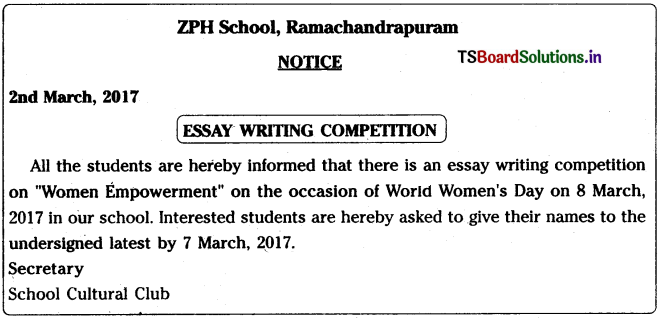

Invitation
Question 3.
You are the secretary of your School Cultural Club. Your school authorities have decided that you are going to conduct a cultural programme on March 8, 2016 on the occasion of ‘World Women’s Day’. Design an invitation card including the necessary details.
Answer:
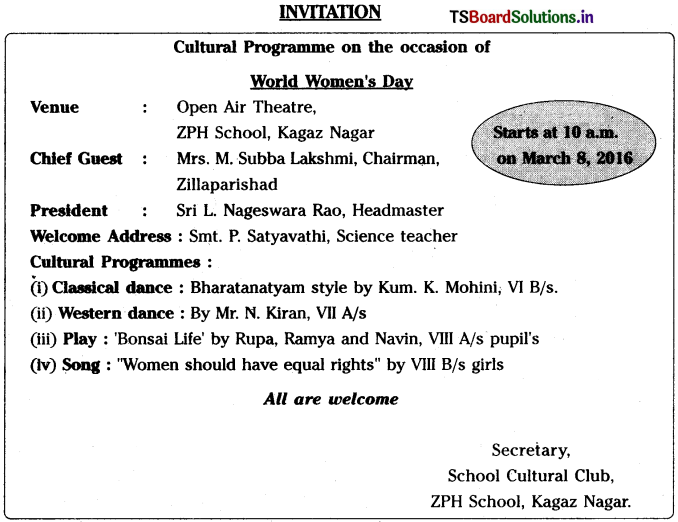
![]()

![]()
![]()
![]()
![]()


